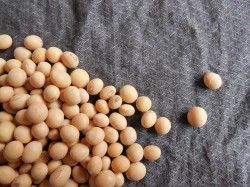Last Word | August 24th, 2016

By Tom Bixby
tom@hpr1.com
On April 22, 2004, a Brazilian ship full of soybeans arrived in the Chinese port of Xiamen. It was not allowed to unload its cargo.
AQSIQ is a ministerial administrative organ directly under the State Council of the People’s Republic of China, in charge of import-export food safety. AQSIQ inspectors said there were “poisonous red seeds” mixed in with the soybeans, and that any shipment with even one red seed in it, that is, one individual bean infected with red fungus, was a health hazard.
Dr. Xin Zhang, Director at the China Council for the Promotion of International Trade, wrote “In accordance with international standards in the soybean trade, every kilogram of soybeans may have three poisonous seeds, and it would be unreasonable to require a zero tolerance.
“In fact, the poisonous seeds with a red agent can be easily discovered by eyes and picked out by hands, and will not poison other normal seeds. The ‘zero tolerance’ policy may fall foul of WTO Agreements in terms of a reasonable domestic regulation.”
The Brazilian government and exporters were rightfully upset. There was nothing wrong with the soybeans. The Chinese had signed a contract stipulating the price prevailing at the time the contract was signed, and the price had tanked.
According to the U.S. Department of Agriculture, the price of soybeans fell from $10 a bushel to $6 in 2004.
So began a trade dispute between the world’s second largest exporter of soybeans and its largest consumer.
Chinese inspectors said that if the present shipment was contaminated, others to come might be as well. On May 20, 2004, they prohibited trade with Brazilian soybean exporters.
The Brazilians needed the money more than the Chinese needed the beans.
Dr. Xin again: “One disguised trade barrier could be the unjustified delay in, or refusal of, the importation of foreign goods or commodities on the ground that they fail to comply with AQSIQ measures.
“For example, AQSIQ might refuse the importation on the basis of a very minor technical flaw that presents no harm to the health or safety of human, animal, or plant life.
“Although the foreign exporter or the Chinese importer may seek an administrative review or litigation to redress any regulatory misconduct, this still means costs, time, and more importantly, the loss of access to the Chinese market.”
It looked like the Brazilian exporters were going to get stiffed, but they had some help. The governments of the three largest soybean exporters, Argentina, Brazil, and the United States, applied pressure, asking the Chinese to be reasonable.
On July 8, 2004, an agreement was reached. The Brazilians were to be paid a lower price and their soybeans were allowed in. Donald Trump is not the only one who knows how to back out of a deal and pay much less than he contracted to pay.
The price paid to the Brazilian exporters was never disclosed, to avoid embarrassing the Brazilian government. The Chinese negotiators knew about saving face, something that might not occur to Donald.
Could a Trump administration cooperate effectively with Latin countries with whom we share interests? We have our doubts.
In a trade dispute between a Trump administration and the Chinese government, whom do you think would get the better of the deal? We hope we never find out.
We think Chinese government officials would eat Donald’s lunch -- Diet Coke, Filet-O-Fish and all.
Hillary, we’re depending on you. Please, don’t blow it this time. You have a lot of experienced advisors. Listen to them. Stay away from the internet. We know you need the bankers, but don’t accept money from convicted felons. Arrange some form of house arrest for your husband, with ankle monitor.
Oh yeah, and if you’re a guest in someone’s house, don’t steal the furniture.
January 15th 2026
January 15th 2026
December 18th 2025
November 18th 2025
September 23rd 2025


__293px-wide.jpg)

_(1)_(1)_(1)_(1)_(1)__293px-wide.jpg)
_(1)__293px-wide.jpg)